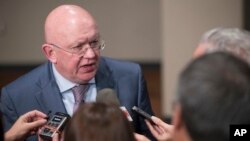Chinese and Russian officials have expressed objections to sanctions the United States imposed Tuesday against several companies for allegedly supporting North Korea's nuclear program.
Chinese Foreign Ministry spokeswoman Hua Chunying said at a news briefing the sanctions are not helping U.S.-China cooperation on efforts to rein in North Korean nuclear activity.
She said the United States should "immediately correct its mistake," and reiterated China's calls for restraint and dialogue to resolve the situation with North Korea.
At the United Nations, Russian Ambassador Vassily Nebenzia echoed one of his government’s ministers who said it is “another unfriendly move by the United States.”
“We strongly condemn unilateral sanctions, not only those aimed at us, but at anybody,” Nebenzia. He said if Washington wanted to sanction third parties, it should do so through existing channels, namely the U.N. sanctions committee for North Korea. There it could put forward names of individuals or companies it believes is violating sanctions and seek to have them added to the sanctions list.
“We first of all condemn that move and secondly, we do not think it is legal,” Nebenzia added. “And thirdly, we do not think it facilitates the stabilization and improvement in Russia-U.S. relations.”
The U.S. Treasury Department announced the sanctions Tuesday, saying they were a complement to a U.N. Security Council resolution passed earlier this month that applied new sanctions against North Korea and condemned the country's ballistic missile tests. China and Russia were among the countries that unanimously approved the August 5th resolution.
A U.S. Treasury statement listed 10 companies and six people, including Chinese coal, steel and financial firms, as well as three Russian individuals.
"It is unacceptable for individuals and companies in China, Russia, and elsewhere to enable North Korea to generate income used to develop weapons of mass destruction and destabilize the region," said Treasury Secretary Steven Mnuchin. "We are taking actions consistent with U.N. sanctions to show that there are consequences for defying sanctions and providing support to North Korea, and to deter this activity in the future."





